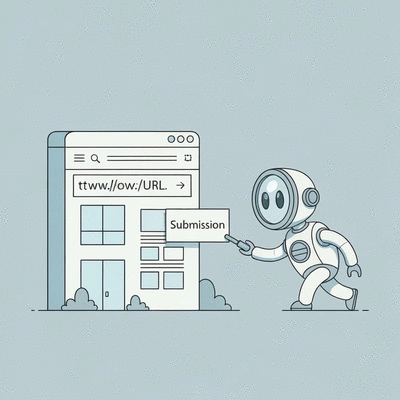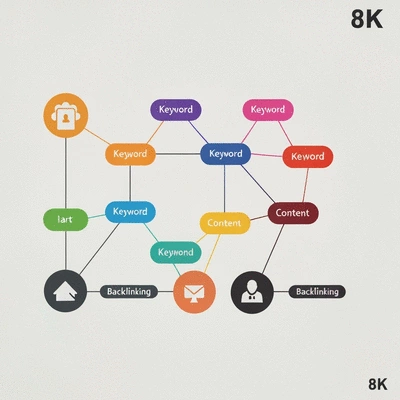Have you ever wondered why your website isn't getting the attention it deserves? The key might lie in understanding search engine submission—a crucial step in getting your content noticed. Let's explore the essential insights that can empower your digital presence.
What You Will Learn
- Importance of Submission: Submitting your website is vital to ensure search engines know about your content.
- Complementary Role in SEO: While submission aids SEO, it doesn't replace the need for comprehensive optimization strategies.
- Regular Monitoring: Keeping track of your site's indexing status is crucial for evaluating submission effectiveness.
- Backlinks Matter: Building quality backlinks significantly enhances both submission and overall SEO performance.
- Content Quality is Key: Search engines prioritize high-quality content, making it essential for successful submission and ranking.
- Timely Updates: Regularly submitting new or updated content helps accelerate the indexing process.
The Journey to Online Visibility: Submission vs. SEO
Understanding the distinct roles of search engine submission and comprehensive SEO practices is crucial for your website's success. This visual outlines their primary functions and interconnectedness.
Search Engine Submission
Purpose: Notify search engines about your website's existence and content. It's the "invitation" for bots to crawl.
- Manual submission (e.g., Google Search Console)
- Automated tools / XML sitemaps
- Crucial for new & updated websites
Search Engine Optimization (SEO)
Purpose: Improve your website's visibility and ranking in search results through various strategies. It's the ongoing "enhancement."
- Keyword optimization & content quality
- User experience & site design
- Backlinks & site authority
The Relationship: Submission Lays the Groundwork for SEO
Submission gets you in the game; SEO helps you win. Without submission, your SEO efforts may go unnoticed. Effective SEO amplifies the impact of submission.
Understanding Search Engine Submission: A Clear Definition
Search engine submission is a fundamental process in the world of digital marketing. It refers to the act of notifying search engines about the existence of your website and its content. This step is crucial for ensuring that your site gets indexed, allowing it to appear in search engine results. Without search engine submission, your website may remain invisible on the internet, making it challenging for potential visitors to discover your valuable content!
What is Search Engine Submission?
At its core, search engine submission is the practice of submitting your website’s URL to search engines like Google or Bing. This can be done manually through their respective submission pages or through various automated tools. The purpose of this submission is to inform search engines about your site’s presence, prompting them to crawl and index your pages. Think of it as sending an invitation to search engines, saying, “Hey, come check us out!” As detailed by Seer Interactive, submitting your site is a foundational step in gaining online visibility.
- Manual submission via the search engine's submission page
- Automated submission through third-party tools
- Utilizing XML sitemaps to facilitate the process
When you submit your website, it sets off a chain reaction where search engine bots visit your site, exploring its pages and gathering data. This is essential for improving visibility in search results, especially for new sites seeking an audience.

The Role of Search Engine Submission in Website Indexing
Search engine submission plays a pivotal role in the indexing process. Indexing is when search engines organize and store information from your website in their database. If you skip submission, your website may take longer to be indexed—or worse, it may not be indexed at all! This is particularly important for new and updated websites looking to gain traction. For more information on why this is important, Sitechecker Pro offers further insights into the benefits of search engine submission.
- Increased chances of faster indexing
- Better visibility in search results
- Opportunity for timely updates to be recognized by search engines
By understanding the importance of submission, we can appreciate how it lays the groundwork for effective search engine optimization. When search engines know about your site, they can include it in their results, which is the first step toward attracting organic traffic and engaging with a broader audience.
Differentiating Search Engine Submission from SEO Practices
While search engine submission is a critical component of getting your site noticed, it’s essential to recognize that it is not the same as search engine optimization (SEO). Many people confuse the two, thinking that simply submitting their site is enough for good rankings. However, this is just one piece of a much larger puzzle.
Why Submission Does Not Equate to SEO
While search engine submission helps get your website on the search engine’s radar, it does not guarantee ranking success. SEO encompasses a wide range of strategies aimed at improving your site’s visibility and ranking on search results pages. This includes optimizing content for keywords, enhancing user experience, and building quality backlinks. In other words, submission is just the starting line, not the finish line!
Understanding the Relationship Between Submission and Website Ranking
As we explore the relationship between submission and ranking, it’s clear that while submission is essential, it works in tandem with many other factors. Search engines use complex algorithms to determine which websites get ranked higher. Factors like content quality, relevance, and the user experience you provide are crucial for improving your ranking.
- Content quality and relevance
- User experience and website design
- Backlinks and site authority
For instance, even if your site is submitted and indexed, it may still struggle to rank if the content doesn’t meet search engine criteria or user expectations. Therefore, focusing solely on submission without a comprehensive SEO strategy can limit your website’s potential.

The Impact of Backlinks on Submission and SEO
Speaking of SEO, backlinks are another critical element that can significantly impact both submission and overall site performance. Backlinks, or links from other websites to yours, signal to search engines that your content is credible and valuable. This not only helps in ranking but can also accelerate the indexing process!
- Credibility through quality backlinks
- Potential for faster indexing due to referral traffic
- Improved ranking opportunities through authoritative sites
In summary, while search engine submission is necessary for getting noticed, it is just one element among many in the broader strategy of SEO. By understanding this relationship, you can build a robust approach for your website’s visibility and success in the digital landscape.
Interactive Poll: Your Thoughts on Search Engine Submission
How often do you submit your website to search engines? Share your approach with us!
Summarizing the Key Takeaways on Search Engine Submission
As we wrap up our discussion on search engine submission, it's crucial to understand its essential role in a holistic SEO strategy. Submission is not merely about informing search engines of your site’s existence; it’s a foundational step that supports your overall visibility online. To truly maximize your website’s potential, a balanced approach incorporating both submission and SEO practices is necessary.
Here are some key takeaways about search engine submission:
- It's a crucial first step: Submitting your website ensures that search engines know about your content.
- Complementary to SEO: It supports SEO efforts but does not replace them.
- Monitoring is vital: Keeping an eye on indexing status helps you understand the effectiveness of your submission.
By knowing the intricacies of submission and its relation to SEO, you can create a strategy that effectively enhances your site’s visibility.
The Essential Role of Submission in a Holistic SEO Strategy
Submission serves as a bridge between your website content and search engines. When you submit your site, you’re not just pushing it out into the void; you’re actively engaging in a process that can propel your content to the forefront of search results. It’s essential to realize that while submission informs search engines about new or updated content, it should be paired with robust SEO practices for maximum impact.
Consider these factors when integrating submission into your SEO strategy:
- Regular submissions: Consistently submitting new content increases the likelihood of being indexed quickly.
- Quality content: Search engines prioritize quality; ensure your submissions contain valuable information.
- Adapting to changes: Stay updated on search engine algorithms to adjust your submission strategy accordingly.
Incorporating these factors into your strategy will set a solid foundation for enhancing your website’s visibility.
When to Focus on Submission Versus Other SEO Practices
Deciding when to prioritize submission over other SEO practices can be tricky. It often depends on your site's current status and goals. For instance, if you’re launching a new site or have recently updated content, focusing on submission is critical. However, once your site is established, regular updates to your SEO strategy become equally important.
Here are a few scenarios to keep in mind:
- New website launch: Prioritize submission to establish your online presence.
- Content updates: Submit updated content to ensure it's indexed quickly.
- Established sites: Shift focus to ongoing SEO practices like backlinking and content optimization.
Finding the right balance between submission and other SEO efforts is key to navigating the digital landscape effectively.
Encouraging Action: Steps to Improve Your Website’s Visibility
Now that we've covered the fundamentals, let's focus on the actions you can take to boost your website’s visibility. A proactive approach to submission can yield significant benefits. By integrating these practices into your routine, you'll enhance your site's discoverability in search results!
Reinforcing the Need for Regular Submission Practices
Regular submission practices are essential for maintaining visibility. Think of submission as a routine check-up for your website—it keeps your content fresh in the eyes of search engines. I recommend setting a calendar reminder to submit new content or updates at least once a month. This keeps your site active and relevant!
Consider the following tips:
- Schedule submissions: Regularly submit new blog posts or articles.
- Review your content: Regularly check if older content needs to be updated and resubmitted.
- Use analytics: Track which submissions lead to the most traffic and adjust your strategy accordingly.
By reinforcing these practices, you'll keep your site on the radar of search engines.
Exploring Further Resources for Comprehensive SEO Learning
Knowledge is power, especially in the ever-changing world of SEO! I encourage you to explore resources that dive deeper into SEO and submission strategies. There’s a wealth of information available that can help enhance your understanding and implementation of effective techniques. For example, Google provides a comprehensive SEO Starter Guide that is invaluable for understanding best practices.
Here are a few great resources to check out:
- Google's SEO Starter Guide: A comprehensive resource for understanding best practices.
- SEO blogs: Follow industry-leading blogs for the latest tips and updates.
- Online courses: Consider enrolling in SEO courses for structured learning.
Each of these resources can provide valuable insights and enhance your skills over time!
Leveraging Social Media Sharing to Boost Submission Results
Lastly, don't underestimate the power of social media! Sharing your content on platforms like Facebook, Twitter, and LinkedIn can significantly boost your submission results. When your content is shared, it not only drives traffic but can also lead to more backlinks, further enhancing your SEO efforts.
To effectively leverage social media, try these strategies:
- Create shareable content: Focus on producing high-quality, engaging content that encourages sharing.
- Engage with your audience: Respond to comments and encourage discussions around your content.
- Use social sharing plugins: Make it easy for visitors to share your content with one click.
By tapping into social media, you can amplify your submission efforts and reach a wider audience!
Frequently Asked Questions (FAQs)
Recap of Key Points
Here is a quick recap of the important points discussed in the article:
- Search Engine Submission is Essential: It's the first step in notifying search engines about your website's existence.
- Not a Replacement for SEO: Submission complements SEO but does not guarantee high rankings; a comprehensive SEO strategy is necessary.
- Regular Monitoring: Keep track of your indexing status to evaluate the effectiveness of your submission efforts.
- Quality Content Matters: Ensure your submissions contain valuable and relevant information to enhance visibility.
- Leverage Social Media: Sharing content on social platforms can improve submission results and drive traffic.






